
REV 0.0 April 18, 2023
Page 1
RS485 Cellular Gateway
Installation Manual
730 The Kingsway Peterborough, ON K9J6W6 Canada
Tel: (705) 740 — 2010 Web: www.abmsensor.com
Fax: (705) 740 — 2563 E-mail: [email protected]
A - Introduction
This manual describes the requirements to successfully connect
up to eight ABM radar level sensor products in an RS485
network hosted by the ABM RS485 Cellular Gateway.
The Gateway not only acquires data from these sensors but can
also control them. Users have access to remotely change all alarm
related functions, while ABM experts can remotely recalibrate
and fine-tune the sensors for optimized performance in their
respective environments.
The Gateway can also be used to power any DC version ABM
radar level sensor (ABM300 series), which can simplify cable
routing in many cases.
B - Requirements
Cellular Network
The key to reliable Gateway operation is suitable cellular phone network access. While urban and developed areas
typically provide excellent cellular signal strength, there may be some installations where the cellular signal is weak. For
such locations, it is highly recommended that the installer determine an optimal mounting location by using a cell phone
display to assess the signal strength.
The standard antenna supplied with the Gateway has a magnetic-base and a 6’ (2m) cable that allows mounting on top of
a tank or structure for optimal signal strength while mounting the Gateway in a more sheltered or accessible area. The
optional SMA-mounted antennas have slightly higher gain. For difficult installations, the ABM Sensor technical team can
provide advice regarding the use of directional antenna and extension cables.
Power Supply
The Gateway requires an input supply voltage of 6 to 30Vdc. Peak power is 6W (1A at 6V down to 0.2A at 30V). This peak
only occurs for a very short period during cellular transmissions.
If the Gateway is connected to supply DC-powered ABM sensors (see Appendix), it supplies an output of ≥18V, provided
the following requirements are met for the supply input voltage (V
IN
):
•
For 1 sensor, V
IN
≥ 6Vdc
•
For 2 sensors, V
IN
≥ 9Vdc
•
For 3 sensors, V
IN
≥ 12Vdc
•
For 4 sensors, V
IN
≥ 15Vdc
•
For 5 sensors, V
IN
≥ 18Vdc
•
For 6 to 8 sensors, V
IN
≥ 21Vdc
The number and type of ABM sensors connected to the Gateway determine its total power requirement. Input current up to
600mA at 21-30Vdc may be required for an eight sensor configuration.



























